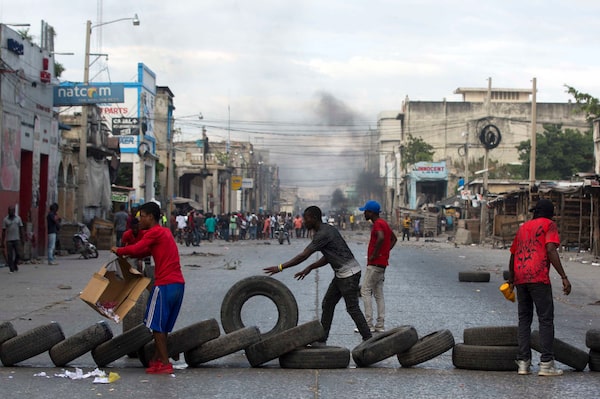
Demonstrators block the road with tires during a protest demanding the resignation of President Jovenel Moise in Port-au-Prince, Haiti, on Sunday, Feb. 10, 2019.Dieu Nalio Chery/The Associated Press
Dozens of Canadians are trapped in Haiti as protesters demanding the resignation of President Jovenel Moïse block road access to the airport. The Canadian embassy in Port-au-Prince has been shuttered since Tuesday, and Global Affairs is now advising against all non-essential travel to the country.
The violent street protests in Haiti have claimed several lives over the past week, with protesters’ anger stemming from skyrocketing inflation and the government’s failure to prosecute embezzlement from a multibillion-dollar Venezuelan program that sent discounted oil to Haiti.
The stranded Canadians include groups of medical professionals from multiple provinces and scores of tourists. In phone calls from the Caribbean country, several individuals expressed frustration with the response from Canadian officials.
“There was no communication saying the Canadian embassy was closing down until we called them,” Toronto nurse Tracey Hotta said in an interview Thursday, speaking from a compound outside of Port-au-Prince where she’s stuck with seven other Canadian nurses. The group – one from Nova Scotia, one from Montreal and five others from Toronto – were supposed to leave Haiti on Wednesday.
Another medical group – in the Caribbean to conduct free clinics in L’Asile, 90 kilometres west of Port-au-Prince – have sought safety at the home of Haiti-born Ottawa physician Emilio Bazile. Dr. Bazile, who is well-connected with officials in the Haitian government, was able to get an armed police squad to disperse protesters from the road so the group could take shelter at his home, Richard Blaquiere told The Globe and Mail from New Brunswick. Mr. Blaquiere’s daughter Rachel is one of the nurses in the group.
"They were attacked and threatened one day, a Molotov cocktail that didn’t go off was thrown at them. They had to be rescued,” Mr. Blaquiere said in an interview. “I’m very disappointed in the Canadian government. I called three times to consular services in Ottawa. I got the same run-around every time.”
He said he was told Global Affairs was monitoring the situation but had no plan to get Canadians out of the country. “When does this become a crisis? … Don’t just ask people to hunker down and hope that it’ll blow over. Do something please.”
Heather Dow, a physician in the group, said they’ve been eliminating options to get out of the country.
“We have our names on a waiting list for a privately owned helicopter company to see if we can get from a nearby field here where this compound is to the Port-au-Prince airport,” she said Thursday.
The cost of a helicopter would come out of their own pockets, stranded nurse Catherine Davies said.
“We’re safe, that’s the main thing. Right now we still have water. Food rations are dwindling but we’re near the ocean so we have access to fresh fish, and there’s lots of coconuts around,” Ms. Davies said. “We’re just hopeful we can get home to our families in the very near future, safely.”
In a statement provided to The Globe and Mail, Global Affairs said it had updated its travel advice and advisories for Haiti on Feb. 12, advising against all non-essential travel. “Our diplomats on the ground are in touch with their counterparts from other countries, as well as local authorities,” they wrote. They didn’t answer a question about how many Canadians are stranded in Haiti at the moment.
In addition to the medical groups, more than a hundred Quebec tourists are stuck in a hotel called the Royal Decameron on Haiti’s Côte des Arcadins. “We have an airplane on standby to bring back these passengers as soon as the roads to the airport are clear and safe,” Air Transat spokeswoman Debbie Cabana said in an e-mail Thursday afternoon. She added that the company was in touch with the tourists, local authorities, the embassy in Haiti and the Canadian government.
The statement from Global Affairs said it is working with tour operators, encouraging anyone in Haiti as part of a package vacation to stay in touch with their operators as the situation develops.
With a file from The Canadian Press